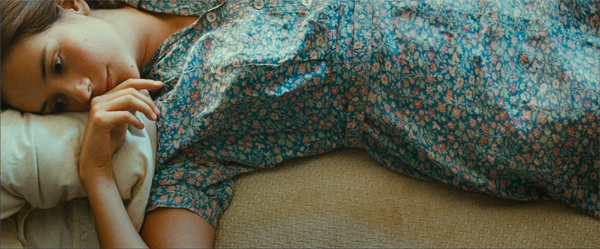Medeas is the story of a rural family caught in the middle of a drought. Calling it a story is actually a disservice, as what director Andrea Pallaoro has accomplished feels more like an intimate documentary that stumbled onto human drama and tragedy in its detailed depiction of quotidian snapshots.
Leading the family are parents Ennis (Brían F. O’Byrne) and Christina (Catalina Sandino Moreno). The location is not specified, though it’s somewhere out West. Ennis works with cattle, and he performs his tasks without joy. He’s pinched on one side by the lack of rain, and on the other by a festering cuckold anxiety, so he reacts to his five children unevenly. Sometimes he’s playful, sometimes bitterly repressive and a disciplinarian. Christina is increasingly absorbed in her own thoughts, leaving the older kids to grope their way through puberty. Despite all this, the ties bind. The film opens with a moment of simple happiness, the family together at a stream.
What brought man and wife together can only be guessed at, which is true of most of the motivations and thoughts in the film. Pallaoro and his co-screenwriter Orlando Tirado have created wide open spaces for their actors to roam, and the cast hint at the rich interior lives, with motionless expressions nearly trembling from what lies beneath.
O’Byrne is well-suited to his role, playing the sort of family man who is solid without being passionate, leaving something for his wife to desire, if not need. He’s a kind of rancher brother to Sam Neill’s Alisdair in The Piano: bewildered by emotions, alternating among unsuccessful tactics to try and regain control over his own life. Perhaps it’s no coincidence that the wives in both films are mute. Moreno’s silences speak volumes; she creates a nuanced personality just by her reactions. Tellingly, the older children know sign language. Ennis doesn’t.
The film’s style owes a lot to Terrence Malick, whose movies are always more meditative than narrative, and whose cinematography finds the breathtaking in commonplace visuals of daily life. In The Tree of Life, even the hanging of sheets on a line became a thing of beauty, and there is some of that magic here. Medeas also bears a resemblance to Charles Burnett’s ultra-indie classic, Killer of Sheep. Both feature affecting moments of longing and well-earned, meaningful metaphors.
Ultimately, there’s a narrative arc here. It begins almost as an afterthought, but grows slowly and inexorably. Certain artifacts, like a Walkman, suggest that Medeas is set in a time not too far removed from our own, but it still feels entombed in history, in an earlier America, innocent and ignorant, that has been read about and, for better and worse, lost. (The arrival of an old analog television set is greeted with great enthusiasm by the family. Its signal picks up only decades-old shows.) Even if it’s an imperfect separate peace the family initially lives in, it’s a beautiful one, and we come to dread the moment when it will be irrevocably broken.
Pallaoro’s sense of composition is masterful, and the way he juxtaposes his images creates startling resonances. Everything is deliberate; one cannot shake the feeling that what has been accomplished here involved a brushing away, a removal of everything unnecessary and distracting, in order to let the actors’ truth and nature shine through.







Leave A Comment